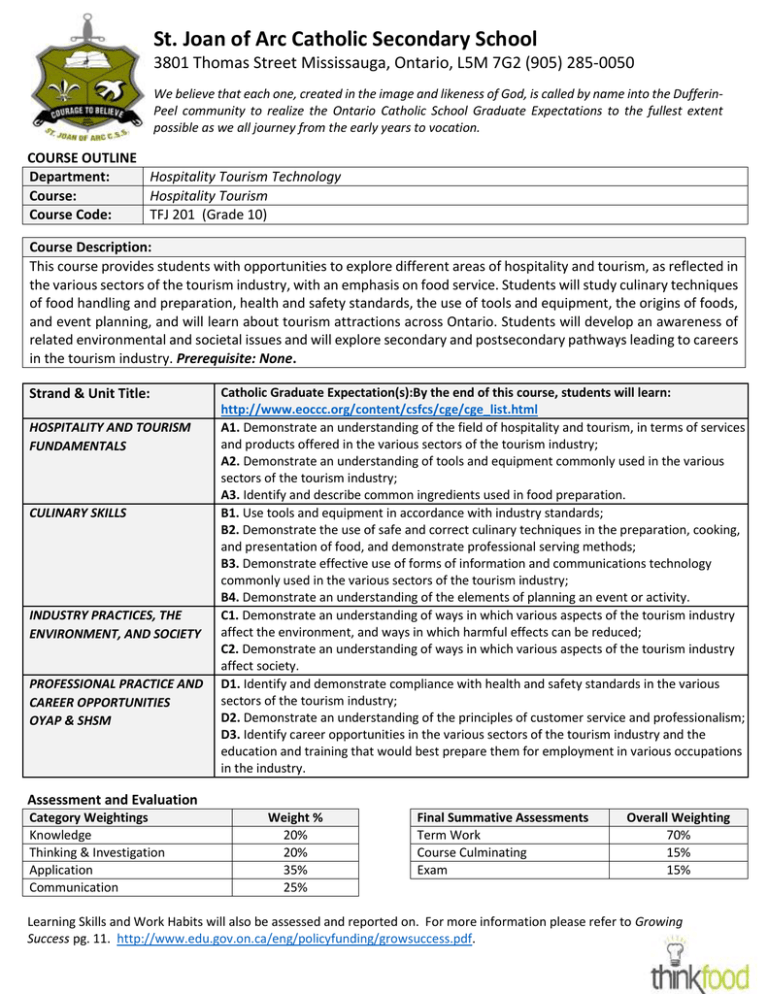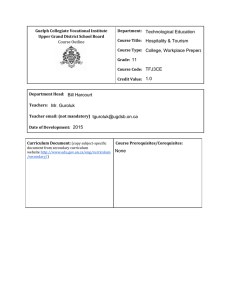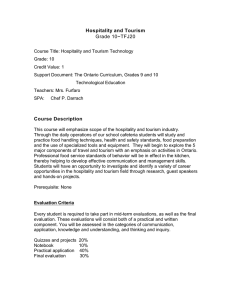St. Joan of Arc Catholic Secondary School
advertisement

St. Joan of Arc Catholic Secondary School 3801 Thomas Street Mississauga, Ontario, L5M 7G2 (905) 285-0050 We believe that each one, created in the image and likeness of God, is called by name into the DufferinPeel community to realize the Ontario Catholic School Graduate Expectations to the fullest extent possible as we all journey from the early years to vocation. COURSE OUTLINE Department: Hospitality Tourism Technology Course: Hospitality Tourism Course Code: TFJ 201 (Grade 10) Course Description: This course provides students with opportunities to explore different areas of hospitality and tourism, as reflected in the various sectors of the tourism industry, with an emphasis on food service. Students will study culinary techniques of food handling and preparation, health and safety standards, the use of tools and equipment, the origins of foods, and event planning, and will learn about tourism attractions across Ontario. Students will develop an awareness of related environmental and societal issues and will explore secondary and postsecondary pathways leading to careers in the tourism industry. Prerequisite: None. Strand & Unit Title: HOSPITALITY AND TOURISM FUNDAMENTALS CULINARY SKILLS INDUSTRY PRACTICES, THE ENVIRONMENT, AND SOCIETY PROFESSIONAL PRACTICE AND CAREER OPPORTUNITIES OYAP & SHSM Catholic Graduate Expectation(s):By the end of this course, students will learn: http://www.eoccc.org/content/csfcs/cge/cge_list.html A1. Demonstrate an understanding of the field of hospitality and tourism, in terms of services and products offered in the various sectors of the tourism industry; A2. Demonstrate an understanding of tools and equipment commonly used in the various sectors of the tourism industry; A3. Identify and describe common ingredients used in food preparation. B1. Use tools and equipment in accordance with industry standards; B2. Demonstrate the use of safe and correct culinary techniques in the preparation, cooking, and presentation of food, and demonstrate professional serving methods; B3. Demonstrate effective use of forms of information and communications technology commonly used in the various sectors of the tourism industry; B4. Demonstrate an understanding of the elements of planning an event or activity. C1. Demonstrate an understanding of ways in which various aspects of the tourism industry affect the environment, and ways in which harmful effects can be reduced; C2. Demonstrate an understanding of ways in which various aspects of the tourism industry affect society. D1. Identify and demonstrate compliance with health and safety standards in the various sectors of the tourism industry; D2. Demonstrate an understanding of the principles of customer service and professionalism; D3. Identify career opportunities in the various sectors of the tourism industry and the education and training that would best prepare them for employment in various occupations in the industry. Assessment and Evaluation Category Weightings Knowledge Thinking & Investigation Application Communication Weight % 20% 20% 35% 25% Final Summative Assessments Term Work Course Culminating Exam Overall Weighting 70% 15% 15% Learning Skills and Work Habits will also be assessed and reported on. For more information please refer to Growing Success pg. 11. http://www.edu.gov.on.ca/eng/policyfunding/growsuccess.pdf. CONNECTION TO OUR CATHOLIC FAITH: Students will incorporate Catholic social teachings, as they become critical and innovative problem-solvers who question the use of human and physical resources as well as understanding the implications of computers and related innovations. An emphasis on problem solving models helps students create solutions that recognize our God-given responsibility to respect the dignity and value of the individual, the protection of the environment and ethical and moral use of the world’s resources. Assessment and Evaluation: To promote student success, ongoing assessment and feedback is given regularly to the students. A variety of assessment and evaluation strategies are used in this course, including daily observations, rich performance tasks, unit tests and projects. (Teacher observations, conversations with the student, and student skills development techniques). Expectations are evaluated based on the provincial curriculum expectations and the strands and/or categories outlined in the ministry document Teaching Strategies: This course will focus on hands-on learning and guided practice of preparing foods within a safe and sanitary environment. Students will learn from teacher demonstrations, peer mentoring, small group discussions and one-on-one instruction and feedback. (The application of the theory). Recognizing that there may be times that the schedule will be modified to accommodate school activities. Major food theory/ practical assignments will be rescheduled. Refer To the Agenda: Make-up / Late Assignment Policy: Assignments are due on the Assigned Due Date. After the due date, assignments will be taken ONLY until the assignments have been returned to students. Hand your assignments directly to your teacher. FOR YOUR PROTECTION, Keep all rough assignment notes until the marked assignment has been returned to you. Information regarding specific assignments will be given to you as required. Due dates will be posted on the bulletin board where the class meets. Tests: Dates will be posted on the bulletin board where the class meets. If you are aware that you will be away for a test, or you are absent from a test due to illness, it is YOUR RESPONSIBILITY to inform the teacher and make arrangements to write a make-up test at another designated time. Note: Students will have access to their evaluation throughout the course; however, students should keep track of their own marks as a safety check! Attendance/Punctuality: Students are expected to be in class and on time every day. For more details refer to the Agenda Late to Class consequences: 1st warning / 2nd detention / 3rd detention + call home and refer to Vice-Principal. Participation/ Uniform: Students are expected to come in full uniform and ready to participate in the daily classroom activities.



